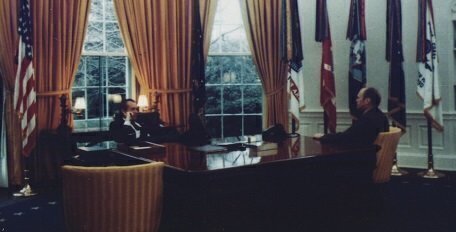Last July, we looked at the debate over presidential self-pardons as part of a review of overall executive pardon powers under the Constitution. Here’s a recap of those arguments in light of the current debate over that subject.
 Debates about presidential pardon powers come up on a regular basis, but in some ways they are among the most misunderstood aspects of executive powers granted by the Constitution.
Debates about presidential pardon powers come up on a regular basis, but in some ways they are among the most misunderstood aspects of executive powers granted by the Constitution.
On Monday, June 4, 2018, President Donald Trump said on Twitter that, “As has been stated by numerous legal scholars, I have the absolute right to PARDON myself, but why would I do that when I have done nothing wrong?” His comments echoed those made by Rudy Giuliani, his attorney, on Sunday.
Here is a brief explanation of the President’s clemency powers, some past cases, and a theoretical look at a Nixon-era question: Can a President pardon himself or herself?
The President has pardon or clemency power under Article II, Section 2, Clause 1, of the Constitution, under the Pardon Clause. The clause says the President “shall have Power to grant Reprieves and Pardons for Offenses against the United States, except in Cases of Impeachment.” The Office of the Pardon Attorney, which is part of the Justice Department, has handled such matters for the President since 1893, and it has a detailed description of the pardon and clemency process on its website.
Although the terms clemency and pardon seemed to be interchangeable, in general terms executive federal clemency is granted after someone had allegedly committed a crime. In most cases, that person is convicted of a crime, and then granted a form of clemency. A pardon allows a convicted person to reclaim lost civil rights after a conviction.
In the case of former President Richard Nixon, he was granted a pardon by President Gerald Ford for any crimes he might have committed during the Watergate scandal, even though Nixon wasn’t charged with or convicted of federal crimes. (This is known as a pre-emptive pardon.) Nixon was able to receive a pardon under the precedent of an 1866 Supreme Court ruling called Ex parte Garland, which allowed for a pardon granted by President Andrew Johnson to remain in force for a former Confederate politician.
So what about the question of President issuing a self-pardon? This is actually a debate going back to the Nixon and Clinton presidencies (but not the Andrew Johnson era).
Legal scholar Brian Kalt wrote extensively about this subject in the 1990s during the Clinton era. (Kalt is also one of the contributing scholars to the National Constitution Center’s Interactive Constitution project.) Kalt said the concept was indirectly debated at the 1787 Constitutional Convention in Philadelphia. James Wilson argued that the Pardon and Impeachment Clauses, which were eventually approved, provided that if "[the President] be himself a party to the guilt he can be impeached and prosecuted.”
The exact question of self-pardoning wasn’t directly addressed at the Convention. "As such, arguments derived from the intent of the Framers are speculative at best," Kalt said. "There are two likely possibilities: Self-pardons either were not considered, or their invalidity was silently presumed. A third possibility, that self-pardons were presumed valid, is less likely."
Kalt believed on precedent that the President doesn’t have self-pardoning powers.” The intent of the Framers, the words and themes of the Constitution they created, and the wisdom of the judges that have interpreted it all point to the same conclusion: Presidents cannot pardon themselves,” he concluded.
But Judge Richard Posner, another widely cited legal authority, said in a 1999 book about the Clinton impeachment that the question was left open by the Founders. “It has generally been inferred from the breadth of the constitutional language that the president can indeed pardon himself,” Posner argued.
And Samuel Morison, a pardon attorney who specialized in that subject at the Justice Department, told the Washington Post last May that a self-pardon could theoretically be done by a President. “My opinion is that in theory that he could. But then he would be potentially subject to impeachment for doing that,” Morison said. “There are no constraints defined in the Constitution itself that says he can’t do that.”
Kalt said Richard Nixon reportedly asked for an internal legal opinion about the option of a self-pardon towards the end of his presidency. The President’s lawyers said he had the power to issue a self-pardon, but Nixon declined to do so.
But just before Nixon’s resignation, the Justice Department Office of Legal Council issued its own memo on the subject, on August 5, 1974. “Under the fundamental rule that no one may be a judge in his own case, the President cannot pardon himself,” said Mary C. Lawton, Acting Assistant Attorney General.
That didn’t mean that a President couldn't find a way to receive a pardon and continue in office. “A different approach to the pardoning problem could be taken under Section 3 of the Twenty-Fifth Amendment. If the President declared that he was temporarily unable to perform the duties of his office, the Vice President would become Acting President and as such he could pardon the President. Thereafter the President could either resign or resume the duties of his office,” Lawton said.
Scott Bomboy is the editor in chief of the National Constitution Center.







